President Carol Folt is retiring after six years filled with challenging hurdles, resounding successes and barrier-breaking collaboration that planted seeds of innovation everywhere at USC. (Photo/Art Streiber)
University
In Full Bloom
After six years of visionary leadership, Carol Folt is retiring as USC’s 12th president. The bold “moonshots” and initiatives she’s introduced have positioned USC as a leader in research, technology, health, athletics, innovation and more.
On a crisp, bright morning in March 2019, Carol Folt hiked through Los Angeles’ Griffith Park and found herself immersed in a rare superbloom.
Stretched across the bright green hills was a carpet of wildflowers — red, blue, orange and purple — patches of color swaying in the breeze,” Folt recalls.
The world-renowned environmental scientist marveled at the once-in-a-decade event, brought on by the year’s heavy winter rains. “It’s renewal, it’s evolution,” Folt says. “You go from dark earth to the raising of all these flowers.”
Forty-eight hours later, the USC Board of Trustees named Folt as USC’s 12th president — the unanimous selection of a search committee that interviewed more than 100 candidates.
Folt, who had just left the University of North Carolina at Chapel Hill after more than five years as its chancellor, saw synergy between the ribbons of color in the hills and the role she was called to at USC. “Universities create the environment for our students and discoveries to bloom,” Folt says. “We are the soil, the water — and we grow the future.”
Now, as Folt prepares to retire from the USC presidency on June 30 after a six-year tenure, the superbloom is an apt metaphor for her bold initiatives coming to fruition.
Her six “moonshot” goals have helped USC blossom as a leader in advanced computing, sustainability, health sciences, affordability and more. Fundraising under Folt has increased markedly from $602 million in fiscal year 2019 to $802 million this fiscal year. A new crop of LEED-certified buildings and collaborative spaces on the USC University Park Campus; the launch of the USC Capital Campus in Washington, D.C.; and USC’s first new school in a decade — the USC School of Advanced Computing, housed in the new Dr. Allen and Charlotte Ginsburg Human-Centered Computation Hall — are concrete manifestations of her vision for growth. These accomplishments are firmly rooted in the culture of “excellence at scale” she has cultivated.
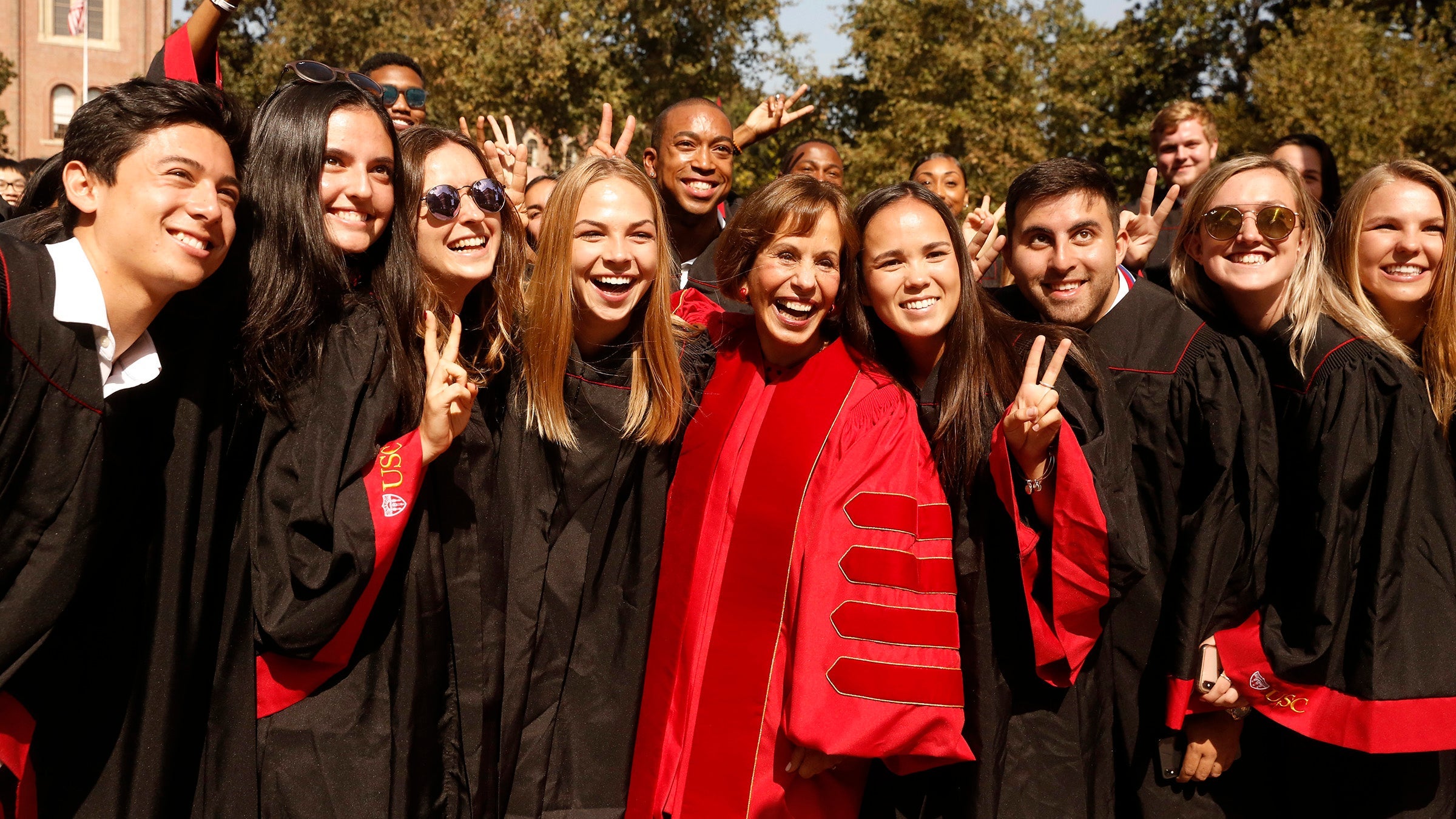
One of the pillars of Folt’s tenure has been placing students at the center of her decision-making in both academics and athletics. She was instrumental in the university’s bold move — announced in 2022 and completed in 2024 — from the Pac-12 Conference to the Big Ten Conference. Membership in the Big Ten bolstered financial support for USC student-athletes and expanded opportunities for them to compete at the highest level. Her courageous leadership positioned USC for long-term success and stability amid the seismic changes that followed in the sports media and collegiate athletic landscapes.
“Carol’s leadership through difficult challenges, as well as her keen strategic eye toward the future that has helped her launch groundbreaking initiatives, will benefit generations of future Trojans,” says Suzanne Nora Johnson, chair of the USC Board of Trustees.
During her years as chancellor, I came to know her as a visionary leader and a highly respected thought leader in higher education.
Kevin Guskiewicz, president of Michigan State University
RIGHT LEADER, RIGHT TIME
Throughout Folt’s university leadership career — which spans 24 years — one of her guiding principles has been that everyone deserves an equal chance to better themselves and their community through higher education.
“I believe deeply in the power of education and exploration to change individual lives,” Folt says. “I’ve lived it.” Folt grew up in Akron, Ohio, and came to California seeking adventure after attending Ohio State University for one year. She enrolled at Santa Barbara City College, later transferring to the University of California, Santa Barbara, where courses in biology and forays into the region’s streams and wetlands ignited her fascination with environmental science.
To pay for tuition and rent, she waitressed 20 to 30 hours a week at a seafood restaurant on the wharf. Her ambition reflected her outlook growing up as one of five children in a big family that included her mother’s parents, who were hard-working immigrants from Albania. Her mom and dad were both chemists who met at the B.F. Goodrich Co. in Ohio.
“We were raised with that immigrant perspective: You come here, you work hard — and education is important,” Folt says.
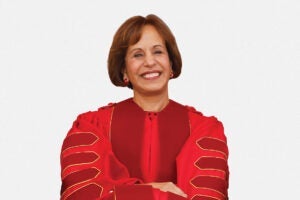
After college, she earned a doctorate in ecology at the University of California, Davis. At Dartmouth College, she became a professor of biological sciences and balanced research and teaching with parenting. She and her husband, David Peart — now an emeritus professor of biological sciences at Dartmouth — have two children, Noah and Tessa, and two granddaughters. Folt rose through administrative roles at Dartmouth to become provost and then acting president. In 2013, UNC-Chapel Hill named her its chancellor.
As chancellor, Folt developed the university’s first strategic plan and led a $4.25 billion fundraising campaign — the largest and most successful in UNC-Chapel Hill’s history. Federally funded research climbed every year during her tenure. She helped the university deftly navigate challenging investigations by the NCAA and the Department of Education’s Office for Civil Rights. The more than 70 reforms she implemented to ensure accountability and integrity across the university included restructuring and modernizing the human resources and Title IX offices.
Folt also led several initiatives to address concerns over the university’s complicated past. She took on the renaming of a building and grappled with a conflict over Silent Sam, a Confederate statue on the UNC-Chapel Hill campus that many students deemed racist but whose supporters wanted to protect as a memorial to the state’s Civil War dead. After protesters toppled the statue, Folt ordered the removal of the statue’s pedestal, basing her decision on the safety of the campus. At the same time, she announced she would resign as chancellor; she left in January 2019.
“During her years as chancellor, I came to know her as a visionary leader and a highly respected thought leader in higher education,” says Kevin Guskiewicz, president of Michigan State University, who served as dean of the UNC-Chapel Hill College of Arts and Sciences while Folt was chancellor and succeeded her in the role. “I admired that she never shied away from making difficult decisions.”
At the time, Folt had already applied for the USC president role. Given the criticism she faced in North Carolina over the pedestal’s removal, Folt offered to withdraw her USC candidacy. But her ability to confront difficult issues with candor impressed the USC Presidential Search Advisory Committee at a time when the university was coming to terms with national admissions fraud issues and a class-action lawsuit involving hundreds of patients who accused a former USC student health gynecologist of sexual misconduct.
The 23 members of the search committee all agreed that Folt was the right person to lead USC at the right time. On July 1, 2019, she became the first woman to permanently serve as USC president after taking the reins from interim President and USC Trustee Wanda M. Austin.
OPENING THE DOOR WIDER
At UNC-Chapel Hill, “Carol often reminded us — faculty and deans — that we were here for the students,” Guskiewicz says. “Student success was front and center in all of her communications.”
The same has been true at USC. Her student-centered focus has been felt in everything from remodeled cultural spaces in the Student Union to her efforts to expand accessibility and affordability. Folt’s background as a former transfer student who balanced work and school motivated her to “open the door wider to make a USC education possible for talented students from all walks of life,” she says. A cornerstone of her tenure has been advancing initiatives to increase accessibility and affordability. One of her first major moves at USC, announced in February 2020, was eliminating tuition for students whose families earn $80,000 or less annually. A related policy excluded homeownership from the calculation used to determine a student’s financial need. About 6,000 undergraduates per year have benefited from this program.
She also committed to significantly expanding financial aid for USC’s transfer students and funding for graduate students. Under Folt’s leadership, fundraising for scholarship support has grown from $80 million in fiscal year 2019 to $126 million this fiscal year.
“These actions have really increased the breadth of applications to USC,” Folt says, noting that admission is at a historic high. “It has put us on equal footing with the most prestigious universities in the world that have very strong financial support.”
A STEADY HAND DURING COVID-19
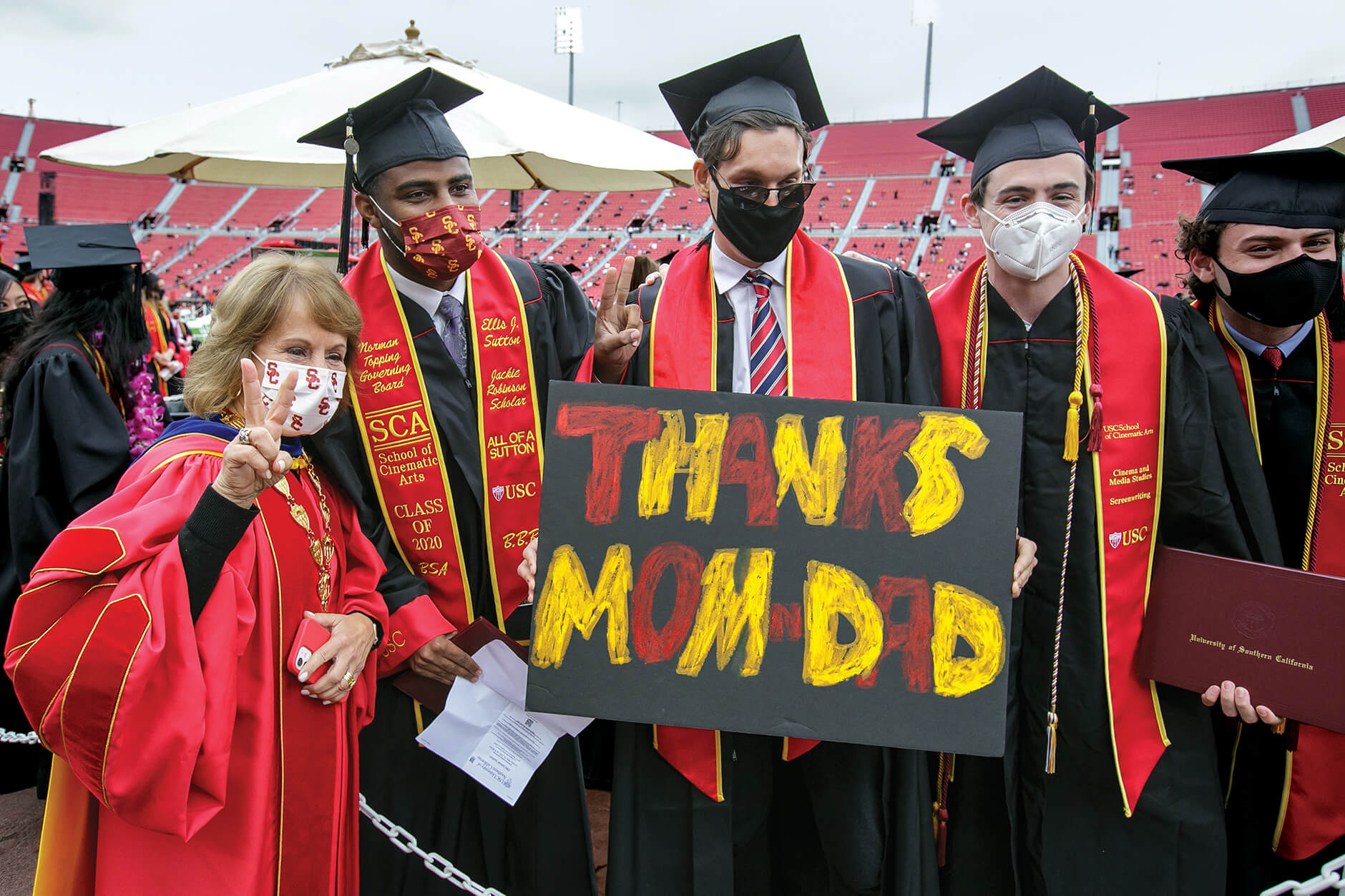
ceremony during the COVID-19 pandemic. (USC Photo/Steve Cohn)
Just weeks after Folt launched the Affordability Initiative, the World Health Organization declared COVID19 a pandemic. Still a relative newcomer to USC, Folt faced the challenge of steering the university through the crisis by drawing upon her deep well of leadership experience and personal grit.
“Impediments have to be viewed as opportunities,” Folt says. “You make a change, you do a pivot, you open a door. You cultivate a ‘beginner’s mind,’ seeing optimism and possibility — instead of fear — in the unknown.”
More than 6,000 courses were quickly reimagined and delivered remotely. Folt helped unite USC’s campus and community — while maintaining safety protocols — to make sure that the educational, medical and community-driven missions continued. Her administration introduced COVID-19 Research and Innovation Funds to support USC researchers in developing drugs and vaccines, studying the pandemic’s social impact and more. In partnership with Keck Medicine of USC, USC launched the Care for the Caregiver program, which provided housing for USC and L.A. County health care workers on the frontlines of treating COVID-19 patients.
“COVID brought forth so much innovation, caring and community at USC, of which I am immensely proud,” Folt says.
In 2021, as the pandemic continued to make large public gatherings risky, Folt insisted on finding a way to safely offer USC’s graduating students he experience of an in-person commencement ceremony — “one of the most cherished memories in a student’s academic life,” she says. Working within public health guidelines, USC hosted 14 graduation ceremonies in seven days at the Los Angeles Memorial Coliseum. Folt, famous for her boundless energy, attended all of them.
Numerous students and families said they appreciated the opportunity to experience graduation in person — including one student who said that she was seated close enough to the stage to make eye contact with Folt, a special moment within her triumphant day.
Impediments have to be viewed as opportunities,” Folt says. “You make a change, you do a pivot, you open a door. You cultivate a ‘beginner’s mind,’ seeing optimism and possibility — instead of fear — in the unknown.
Carol Folt
RESTORING TRUST IN THE MISSION
Folt’s ability to find opportunities within obstacles helped USC resolve legal problems and restore a tarnished reputation. She propelled the ongoing Culture Journey forward, emphasizing USC’s six unifying values supporting its mission. She also tripled the number of mental health counselors for students and took other actions to ensure the safety and well-being of the USC community.
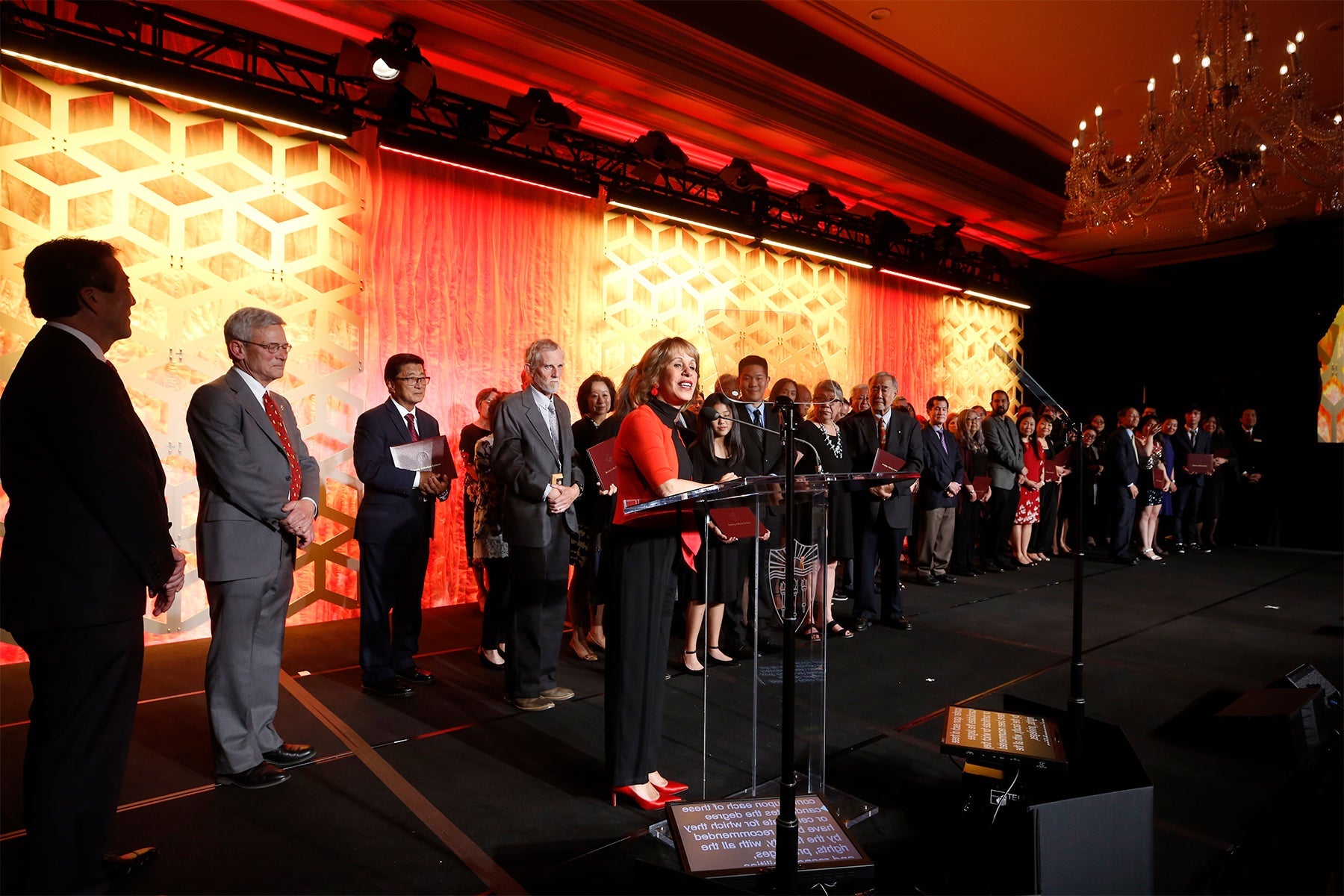
Her leadership also helped USC rectify deeply painful episodes in its history. In April 2022, she conferred posthumous degrees upon Japanese American USC students of the Nisei generation (born in the United States to parents who immigrated from Japan) who were forced into detention during World War II and barred from returning to campus after the war. A granddaughter of one of these USC Nisei students wrote a letter to Folt, saying that she could not begin to describe how meaningful the tribute was to her and her family. “It has brought so much peace to a piece of my heart,” she said. Folt also dedicated the USC Nisei Rock Garden at the University Park Campus as a tribute to these students.
“My own experiences have taught me that a powerful way to avoid repeating injustice is by admitting it, remembering it and correcting it,” Folt says.
She spearheaded the renaming of two USC landmarks previously named for divisive figures. In November 2021, USC announced that the Von KleinSmid Center would be renamed to honor Joseph Medicine Crow, the late Native American historian and renowned Apsáalooke (Crow) Nation chief, who earned his master’s degree at USC. In January 2023, the university named the home of USC track and field for 11-time Olympic medalist and alumna Allyson Felix.
“A great university like ours should have an arc of purpose that encompasses learning from, remembering and reckoning with our past — while at the same time striving, innovating and building a better, more equitable future,” Folt says.
SHOOTING FOR THE MOON
As Folt looked ahead, she worked with deans across the university to develop a strategic framework for an ambitious objective: positioning USC as an international leader for innovation and preeminence at scale. Recognizing the unparalleled resources of USC’s 23 schools, she dubbed USC the “school of schools” for its size, scale and breadth. She declared the 2020s “the decade of collaboration on warp speed, the decade we eliminate barriers between disciplines and build bridges.”
In 2022, Folt launched what would become a centerpiece of her presidency: moonshot goals intended to propel the university forward across disciplines. The first three moonshots included what came to be called USC Competes, aimed at recruiting and retaining the nation’s best and brightest students, faculty and staff; Health Sciences 3.0, aligning USC’s health system and five health sciences schools to catalyze research and develop new models of care; and Frontiers of Computing, to accelerate research and innovation in advanced computing with a focus on ethical considerations.
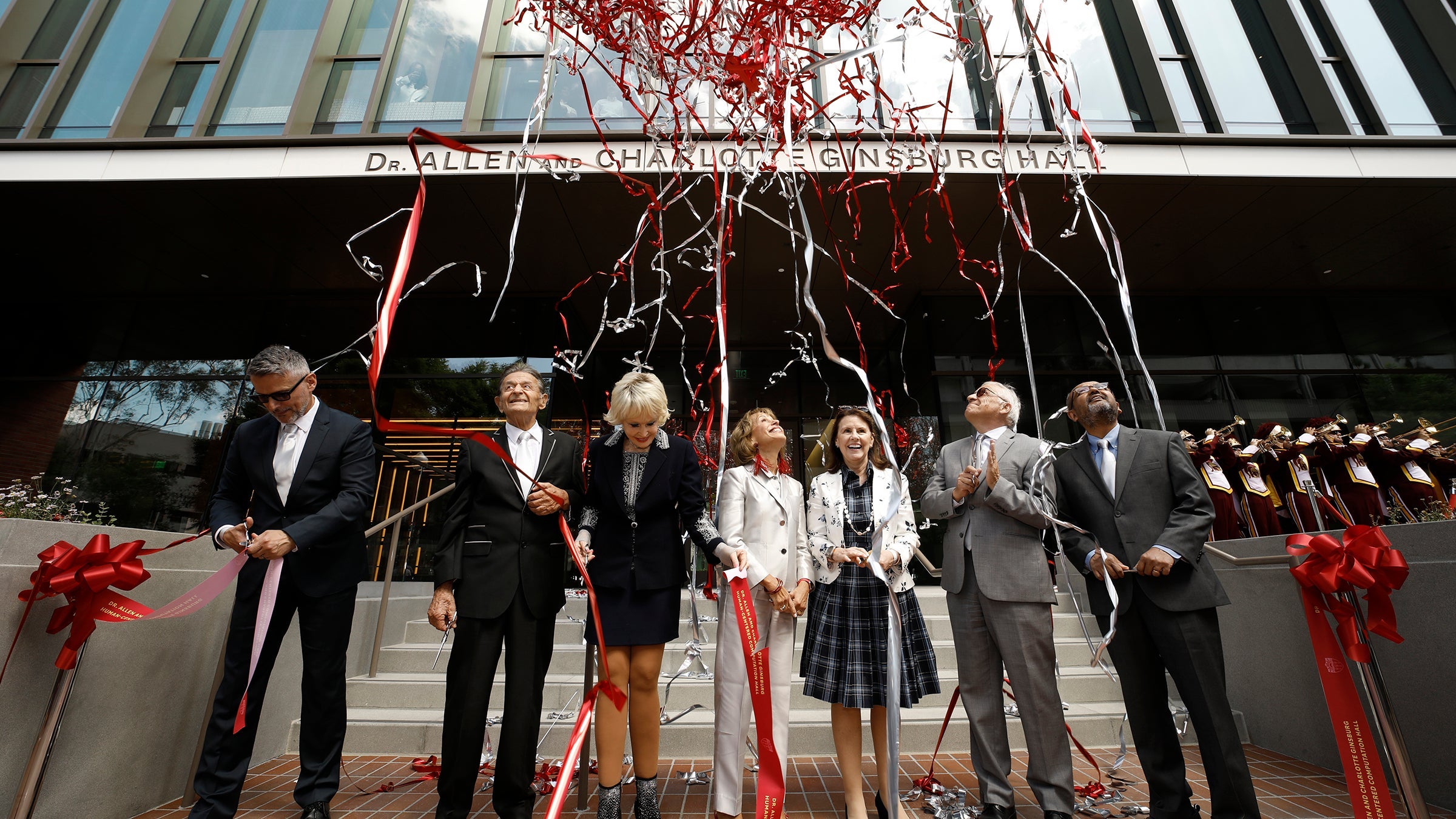
Later, she would add three more moonshots that formalized initiatives she had been working on since her arrival in 2019 — goals with deep personal resonance.
As an environmental scientist, Folt made her name through research on climate change, salmon conservation and mercury and arsenic in water. In September 2019, she launched an interdisciplinary Presidential Working Group on Sustainability in Education, Research, and Operations geared toward lowering the carbon, water and waste footprints of USC campuses. The Sustainability moonshot expanded that vision to integrate sustainability into campuswide education, research, operations and community outreach.
“President Folt’s commitment to sustainability has been unwavering,” says Dan Mazmanian, emeritus professor of public policy at the USC Price School of Public Policy and the inaugural chair of the Presidential Working Group on Sustainability in Education, Research, and Operations. “Less recognized is the significant effort this required in fostering collaboration of faculty, students and administrators in pursuit of common purpose.”
A former advisor to the female student-athletes at Dartmouth College, Folt is regarded by her peers as a thought leader in college athletics. She has been a champion of USC Athletics since the outset — and a spirited spectator at Trojan games. Student-athletes love that the president attends their games, wearing Trojan gear (invariably wearing cardinal and gold sneakers) and cheering them on. The Reimagining Athletics moonshot prioritized building a stronger athletics program with transformed facilities. Her decision to move USC to the Big Ten Conference dramatically increased USC’s national profile.
“Our coaches are really grateful to Dr. Folt for her commitment, her vision and her steadfastness in supporting our programs and the investment that she made,” says Jen Cohen, USC’s director of athletics. “Our coaches know that they’re cared for, not just by me, not just by the athletic department, not just by fans, but by the president of the university. And that makes a huge statement to our coaches, to our student-athletes, to our fans and our future students.”
In college, Folt studied studio art before switching her major to biological sciences, and in her life and work as a scientist, the arts continued to profoundly influence her. With the USC Arts Now moonshot, launched in November 2024, she envisioned collaborations at the intersection of art, science and more. The initiative has ignited partnerships among USC’s six conservatory-level arts schools and connected the arts to all disciplines at the university’s campuses.
In addition to strengthening cooperation across the university, the moonshot framework has helped boost philanthropy in key areas. The $1 billion-plus Frontiers of Computing initiative began when Folt reimagined a $260 million lead gift from the Lord Foundation of California. Fundraising for the health sciences has jumped from $82 million in fiscal year 2019 to $231 million this fiscal year, while athletics fundraising during the same period has increased from $43 million to $61 million.
Carol was hired at one of the most important moments in USC’s history, and her leadership skills, innate ability to connect with students and her dedication to the Trojan Family as her North Star have been on display throughout her tenure.”
Suzanne Nora Johnson
AN EXPANSIVE IMPACT
Rick Caruso, who was chair of the USC Board of Trustees when Folt was hired, characterizes Folt’s contributions to USC as meaningful and lasting. “Carol’s ability and experience to manage a highly complex organization with multiple constituents is profound,” Caruso says. “There is no doubt that she will be remembered as one of the finest presidents in the history of USC … [and] as one of the premier leaders in all of higher education.”

Examples of USC’s “preeminence at scale” now abound: Research expenditures have grown 44% since 2019 and topped $1 billion for the first time in 2023. In that same year, USC established its world-class Capital Campus in Washington, D.C. It was Folt’s vision for USC to have an influential presence in the nexus of government where students and faculty can collaborate with policymakers and newsmakers to address and create solutions to complex problems. In 2024, the university received a gold rating for its sustainability efforts from the Association for the Advancement of Sustainability in Higher Education. In October, the women’s soccer team became the first to win a Big Ten crown for any USC sport.
“I hope when people think of USC, they’ll think of a place where there is excellence in ‘everything, everywhere, all at once,’” Folt says, alluding to the 2022 film of the same name.
Folt herself seems to have been everywhere all at once during her tenure. Those who have worked alongside her note how much she loves to get out of the office to talk with students, faculty and staff and gather with groups. On any given day, you might find Folt cheering on Trojan student-athletes at a lacrosse game, dancing alongside students at cultural events, traveling to promote USC in India, speaking at an alumni conference or a class, or attending a faculty meeting.
“I learned early on that being warm and friendly doesn’t make you less successful,” says Folt, who has aimed to “spark kinetic energy” and “cultivate creativity, joy and kindness” within the USC community. After she retires as USC president, she’ll remain part of the community as a faculty member with appointments in biological sciences, civil and environmental engineering, and population and public health sciences.
“Carol was hired at one of the most important moments in USC’s history, and her leadership skills, innate ability to connect with students and her dedication to the Trojan Family as her North Star have been on display throughout her tenure,” Nora Johnson says.
In January, when wildfires in Pacific Palisades and Altadena displaced around 150,000 people from their homes — USC faculty, staff and students among them — Folt and the USC Board of Trustees acted quickly to shore up community support. While the fires were still burning, they launched the Trojan Family Relief Fund to aid Trojans in need.
Many of the Los Angeles hills carpeted with flowers during the 2019 superbloom are now scorched by wildfire flames. But Folt sees resilience in the landscape — fire can trigger the germination of dormant seeds in the soil — and in the university community she’s helped strengthen for the past six years.
“There is hope, renewal, the endless cycle of life, through good times and bad — and the strong, diverse, and magnificent seed bank reservoir that is our Trojan Family,” she says.



